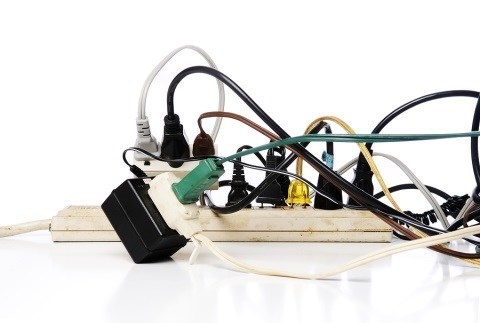
Features
Articles
Technical Safety BC highlights common causes of residential electrical fires
October 10, 2018 | By Peter Saunders

October 10, 2018 – To help mark this year’s Fire Prevention Week (FPW), which runs from October 7 to 13, Technical Safety BC is highlighting several common hazards in people’s homes that can cause electrical fires.
1. Overloaded power bars
While power bars are effective at minimizing the potential impact of electrical surges, many homeowners overload them (example pictured). Today, most 120-V power strips are rated for a maximum load of 12 A, which a few appliances can easily exceed. A 1,300-W toaster and a 1,100-W coffee maker, for example, have a combined load of 20 A, exceeding a power strip’s capacity and creating a risk of overheating and fire.
Technical Safety BC encourages consumers not only to avoid using power strips for energy-intensive items, but also to check them frequently for signs of overheating, such as sparking or scorch marks, and to call a licensed electrical contractor if a breaker is tripping or a fuse is blowing continually.
2. Heaters near combustible materials
Following a house fire last year on Vancouver Island that resulted from a blanket falling behind a couch and on top of a baseboard heater, Technical Safety BC is reminding consumers to keep all combustible materials—such as clothing and curtains—away from electrical and other sources of heat. Depending on the type of heater, this clearance may vary from 50 to 300 mm, so it is important to check and follow manufacturers’ instructions.
3. Copper-only devices on aluminum wiring
Many homes built in the 1960s and ’70s have aluminum branch circuits, which are not compatible with today’s standard off-the-shelf (OTS) copper-rated devices. In one electrical fire incident, Technical Safety BC found an aluminum branch circuit feeding a gas furnace that was rated by the manufacturer for copper only. The wire nut used to terminate the branch circuit to the furnace oxidized, creating a hot spot and the subsequent fire.
To avoid such problems, Technical Safety BC encourages consumers to call a licensed electrical contractor if they (a) suspect they have aluminum branch circuit wiring in their home and (b) would like to update their plugs, switches or light fixtures, as this is regulated work.
Print this page